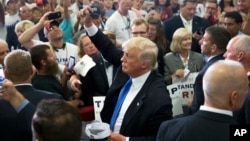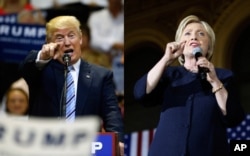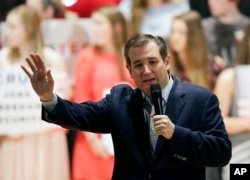Brittany Dasher has always wanted to be a delegate at a Republican Party convention.
“It’s kind of one of those bucket list things for me,” says Dasher, a life insurance agent from Savannah, Georgia.
Dasher is one of nearly 2,500 delegates from around the country who will converge on Cleveland Ohio, next week for the Republican National Convention.
Coming from all walks of life, delegates are a mix of veteran party leaders and up-and-coming activists who represent their states or districts at the national convention, held every four years.
The delegates’ tasks are fairly straightforward: nominate the presidential candidate voters have chosen, attend speeches and other events meant to gin up party loyalty, and agree on a party platform that reflects Republican principles.
At least that’s how things usually go at national party conventions. But this the most unpredictable Republican convention in a generation, and no one has any idea what to expect, including Dasher.
“I’m taking blood pressure medication,” she says with a chuckle. “And I’m only 30 years old.”
Trump hostility
The uncertainty looming over the convention is largely because of the presumptive nominee, Donald Trump, whose unexpected and untraditional candidacy has exposed deep divisions within the Republican Party.
Republican complaints about Trump are diverse. Some don’t see him as a true conservative. Some take issue with his aggressive and unpredictable temperament. For others, the matter is practical: Trump is consistently trailing in opinion polls behind Democratic candidate Hillary Clinton.
Whatever the reason, there is seemingly an unprecedented level of hostility among some Republicans for the man who, ironically enough, won more votes than any other Republican primary candidate in history.
Unbind the delegates
Some forces within the party are determined to do all they can to stop Trump from winning the nomination, even if it means changing the rules at the last minute.
Their effort is focused on “unbinding” the delegates, most of whom are seen as being obligated to support whatever presidential candidate won their state or district. If the delegates were to become “unbound,” they could then vote their consciences and possibly deny Trump the majority of delegates he needs to clinch the nomination.
Unbinding the delegates is a long shot, and the effort could be aborted before it even begins. The first hurdle to clear is the convention rules committee, which convenes on Thursday and meets through the end of the week.
To survive, the so-called “conscience clause” must have the support of at least 28 out of 112 members of the rules committee. If it does, the measure would be sent to the convention floor next week, where a majority of delegates would then have to vote to unbind themselves.
That is a nightmare scenario for Trump, and would threaten to derail the entire convention.
Party split?
If the delegates were unbound, it could result in a “horrible party split,” says Morton Blackwell, who sits on the rules committee.
Like many veteran members of the party, Blackwell is reluctant to engage in any floor battle that risks not only deepening divisions but also puts them on clear display in front of the nation.
“It would be a disaster,” he says. It also wouldn’t be fair, since “the entire process of the primary and state conventions were based on those rules.”
Party leaders and Trump surrogates are working hard to make sure a delegate revolt doesn’t happen. Instead, they’re projecting an image of stability, and dismissing the threat as a desperate, last-minute effort.
“That’s more of a symbolic effort on their part. They’ve got a bunch of paid consultants trying to make money,” said Bill Palatucci, a Republican national committee member who is also on the rules committee.
Palatucci, a Trump supporter, acknowledges the Dump Trump forces may be able to secure the 28 votes needed to pass the rules committee. “But at the end of the day, it’s pretty clear…there’s no inclination to change the rules in the middle of the game,” he insists.
Open mind
But many delegates aren’t so sure.
“I’m going to keep an open mind,” says Paul Brierley, a Republican delegate from Arizona. “If there were no reason for delegates to go and think about stuff, then they wouldn’t have to have a convention.”
Delegates like Brierley, who prefer candidates other than Trump, face a difficult decision: do they do what they think is best for the country, even if it means disrespecting the will of voters in their state?
“Certainly it weighs heavy on my mind,” says Brierley, who like all of Arizona’s 58 delegates, is bound under party rules to vote for Trump on the first ballot. “I wouldn’t lightly go against that.”
Unrest
There are also concerns about unrest if delegates successfully deny Trump the nomination. There are already mass protests planned outside the convention hall, and the blunt-speaking Trump himself has warned his supporters could riot. The fears are heightened since Trump's events have already been marked by somewhat regular altercations between supporters and opponents.
Constantin Querard, an Arizona delegate who worked on the campaign of Texas Senator Ted Cruz, is well aware of how tense the convention could be. In the lead up to the convention, Querard has received a steady stream of hate mail, including death threats.
“Death wishes is a more accurate description,” he clarifies. One Facebook message from a Trump supporter, he recalls, had the seemingly innocuous subject line: “I’m praying.”
“But I opened it up and it said, ‘I’m praying that you get advanced prostate cancer and that your mom gets ovarian cancer…and that God grants you a speedy death,’” he says, laughing. “That’s not what I thought it’d be.”
But Querard is indicative of the difficulties faced by the movement to stop Trump. While he takes issue with many aspects of Trump's candidacy, he doesn't believe it would be right to change the rules at this point.
"We already agreed to this. We can't change our minds now," he says. "My conscience tells me I'm voting for Trump on the first ballot."
If not Trump, then who?
Another issue is that no clear alternative to Trump has emerged. The most likely alternative is Cruz, who finished second in the primary election. But Cruz has distanced himself from the anti-Trump forces. And while he hasn't endorsed Trump, he has taken apparent steps to mend relations, including accepting Trump's offer to speak at the convention.
The vacuum is leaving many delegates feeling like they have no choice but to line up behind Trump, like it or not.
“He’s not my first choice, absolutely not,” says Dasher, the Georgia delegate. “But he’s the only option we have.”






